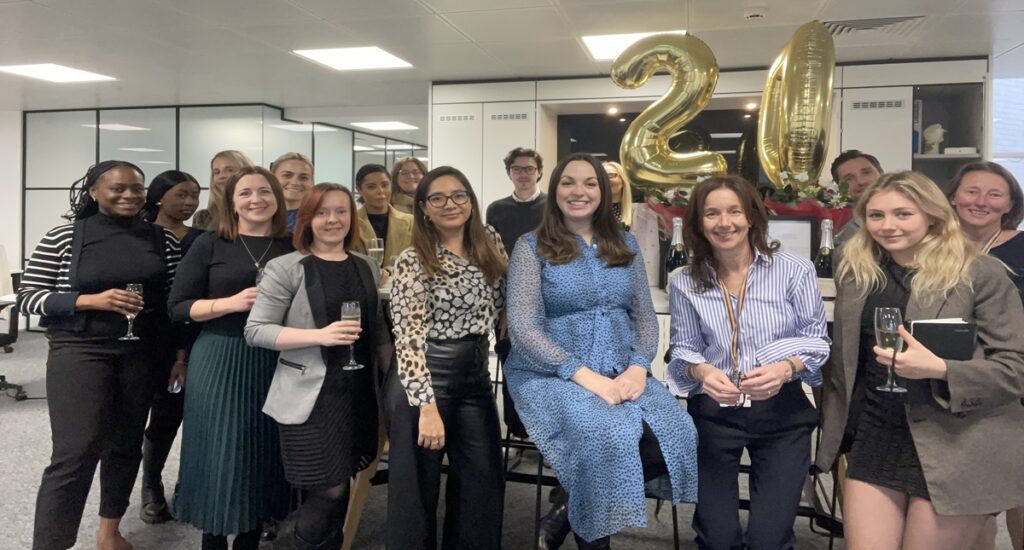By now I am sure the phrase “it’s a crazy market right now” has been overused and worn out too many times. Recruiting post lockdown and hiring freezes are unfamiliar territory, with no clear pathway to navigate. At LAW Absolute we aim to provide a consultative recruitment service and as such have detailed, what we think, will help hiring managers to recruit in this brave new market!
Keeping up with the (k) Competition
With the market busier than ever before and more jobs than candidates available, it is essential organisations are staying competitive. Competitive in relation to not only salaries for existing and future employees, but also flexible working, benefits, and culture.
Staff retention is key. The best strategy for handling counteroffers is in fact to avoid them altogether. However, when faced with a possible counteroffer situation it is essential employers get to the root cause of a resignation. If as employers you can fix the problem, then do. If not, it is advisable you accept the resignation rather than grapple with the “better the devil you know” approach and instead focus your energy on hiring new recruits. Our best advice would be to ensure you avoid a situation where you are six months down the line and have lost time, money and fundamentally the employee and instead focus on moving forward and building your team.
Companies need to appreciate that rarely will money be the only motivator for moving. If you are hiring new staff, it is essential you understand their motivators and impress upon them why your organisation match what they are looking for in the long term. Candidates will usually be in the process with more than one organisation, therefore being able to effectively sell the benefits of your company in line with the individuals own values and motivators is paramount. Of course you need to understand the salary they are seeking, other offers potentially on the table and the type of roles they are interviewing for- this is smart interviewing but, what is essential and sometimes undervalued is genuinely understanding what matters most to the person you are interviewing (whether that be flexible hours, an ability to have a PT session twice a week at 4pm, progression, work/life balance) and ensuring you can honestly meet their expectations.
Due to the busy nature of the legal market, we advise employers limit the number of stages involved in the interview process. Speed is key. If you usually operate a 3-stage interview process, ensure those interviews take place within a 7-to-10-day period. Any longer and the candidate will no longer be available as someone else would have moved faster and snapped them up. Ensure the interview involves a mix of technical questioning but also meet and greets with team members, managers and the wider business. It is essential interviews do not take the form of an interrogation, building a rapport is more likely to ensure you are successful in your hiring.
Making the Most of Multiple Offers
In the current start of the market candidates are likely to be in multiple processes and therefore receive multiple offers. For the first time in a long time the market is candidate poor and job rich; finding the right candidate is not as easy as it once was and keeping the interest of that candidate is even more of a challenge.
Due to the above, information gathering is key. Understanding the reason why a candidate is seeking a job and what other jobs they are interview for will help guide and formulate an appropriate interviewing technique and route. Whilst some candidates will be hesitant in detailing too much about their other processes most will reveal the industry and type of contract as well as the softer package on offer such as hybrid working. This information is key and can be used to the advantage of the employer to not only understand the commitment of the candidate but their potential longevity in the business.
Timing is everything
Failure to have a clear interview process leaves employers at risk of failing to attract the right new talent.
As mentioned above, candidates are no longer motivated by money alone. Candidates are now opting out of interview processes due to concerns and reservations about the culture of the company based on the interview process and interactions during the interview stage.
Without doubt, behind every successful company is a team of employees delivering results. Employees are everything. To ensure you don’t lose out on candidates during the interview process, we would advise ensuring you have the following in place:
- A clear interview process – a long interview process only causes frustration and loses momentum. Ensure you have a clear process in place that may involve no more than 3 stages that covers the issues that are key to you and the organisation but keeps the potential new hire engaged and interested. The interview process reflects your brand and organisation. Long drawn-out processes only result in candidates losing interest.
- Have a clear strategy around your interviews – interviews take time and effort, not only for potential new hires but employees involved in the interview process. Ensure your interview times are considerate. If someone is in a role, try and offer interview times around lunchbreaks or after work. This will show a new hire that you have an understanding of the fact interviewing at an awkward time during a work day may not always be easy. Ensure your questions are not repetitive. The worst types of interviews have numerous stages with inexperienced interviewers asking the same questions each time but in a different way. If your interview has multiple stages, ensure they offer something different each time and give an insight in to your company.
- Interview in quick succession – we highly recommend interviewing shortlisted candidates in quick succession. The more drawn out the process between the various stages and decisions, the more likely you are to be unsuccessful in recruiting. Don’t make candidates wait for feedback. No feedback or vague feedback is poor and only leaves a negative impression on the organisation. Provide personalised feedback as soon as possible and ensure you keep momentum, should you want to bring the candidate back in for another stage.
- Ensure internal communication is top tier – communication between interviewers, HR and others involved in the process is essential. A lack of communication will only slow down the process and cause confusion.
- Sell, Sell, Sell! – interviews are a two-way process. Companies need to sell their business, culture, benefits and long-term plans. It is essential you show your passion for the company as this is ultimately what candidates will buy into.
- Offer – when you are at offer stage, ensure your offer is clear. If you offer verbally, ensure you follow up in writing. Provide full details around the salary, bonus, benefits etc. and ask for a decision within a fair but specified time frame.
Read the article and comment on LinkedIn





